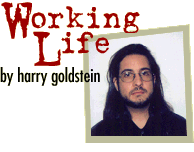WORK & MONEY

STEALING IS SUBVERSIVE
Published March 26, 1996
Previous columns
by
Harry Goldstein
I mean stealing in the broadest sense -- like tossing your sister's birthday card into the office mail bin. Slipping pens, paper, and the occasional Post It pad into your pocket. The file folders, white-out or that certain piece of software that finds its way into your bag. The occasional pair of socks or jeans if you work in retail. Maybe a bottle of wine or a bag of fresh pasta if you work in a restaurant.
The reasons we steal from work are as disparate as the things themselves, but a friend of mine summed it up nicely when I asked her if she ever pilfered from work. "Is the Pope Polish?" she replied. "I steal from work because I like little office knickknacks. I don't really need a stapler at home, but it makes me feel important to have one. Not important enough to buy one, though. Sometimes I feel like I deserve what I steal. Sometimes I don't, but I steal anyway to get back at the manager. Sometimes I just needed the item I stole."
Two very general categories emerge: I-need-it-and-they-can-afford-it, the old Robin Hood justification, and they-don't-pay-me-enough-(money, respect... insert your grievance here)-so-I-deserve-it -- a.k.a. stealing as a form of expression.
The story of how a 'zine of mine was printed combines both categories. We didn't have enough money to go to Kinko's and there was always someone watching me at my office. Through a network of friends, my co-editor and I came in contact with a guy who worked at a the corporate headquarters of a certain megabank who was more than happy to run off copies for us. Hundreds of copies. Thousands and thousands of pages. He told us that he took advantage of his position to help other needy people every time he got the chance because he was never going to move out of the copy room, he was thinking about quitting anyway, and he viewed complimentary printing as a politically subversive act.
If you can see what he means by politically subversive (not merely making the bank into a Corporate Sugar Daddy by letting it pay for a magazine that would make any self-respecting vice president run puking to the executive bathroom), you can begin to see why stealing from work is the dirty little secret of the American workplace. Corporations steal from people all the time, by not paying them fairly for their labor, by taking advantage of a tax system heavily skewed towards their interests, by moving jobs to other countries. They do all of this in light of day, with the full blessing of our elected officials, whose campaigns are bankrolled by these same corporations.
Turnabout, however, is not fair play. Maybe no one will notice if you take a pen home with you, but it's not o.k. to call your mother in Puerto Rico on the company phone, because someone's going over the phone bills with a fine toothed comb. Maybe it's o.k. to copy your face and put it up in your cubicle as a decoration, but woe be unto you if you are caught copying that text book you don't want to pay $60 for. These are all lines that have been drawn to constantly remind workers of their position: step over them and risk corporate wrath.
As long as workers view their own actions within the matrix established by the corporation, all is well. Once workers start seeing petty theft as expressions of political will, a dangerous beast is unleashed: The Activist Worker, who sees herself as acting against corporate oppression and in the interests of other workers.
When the individual worker sees her actions as being part of something larger, she's moved beyond the boundaries created in her mind by corporate propaganda. A box of paper clips stolen with full awareness of the implications might lead to a demand for a raise, a longer lunch hour, better health benefits or improved working conditions.
This epiphany leads to another: stealing is a silent, individual form of expression, doomed to remain forever hidden; putting your voice together with your colleagues to demand better treatment, however, is something that can't be ignored.
Corporations are content to let workers believe that by stealing they are being subversive, when in reality, businesses let workers get away with very little. The corporation you work for can afford a box of paper clips; they can't afford workers becoming aware that their employer allows them to get away with the little things. Once that happens, real change becomes a possibility and petty theft is exposed for exactly what it is: the illusion of power.
Why do otherwise honest people feel free to steal things from their workplace? The answer: they -- our employers -- want us to.
Harry Goldstein is a writer and editor living in Manhattan. His work has appeared in Utne Reader, American Book Review, Promethean, AltX, word.com, and other periodicals.
© 1996 Harry Goldstein, All Rights Reserved
